Search the Special Collections and Archives Portal
Search Results
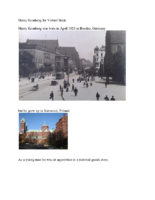
Biographical essay about Henry Kronberg, 2014
Date
Archival Collection
Description
Henry Kronberg was nineteen when the Nazis invaded Poland. He was sent to several labor camps, and liberated in 1945.
Text

Photograph of Henry Kronberg at Stoney's Pawn Shop, 1964
Date
Archival Collection
Description
Henry Kronberg stands in front of the firearms display at Stoney's Pawn Shop at 126 S. First Street.
Image
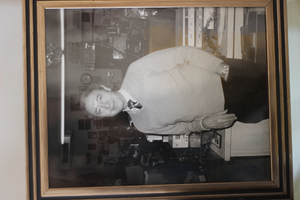
Photograph of Henry Kronberg at Stoney's Pawn Shop, circa 1980
Date
Archival Collection
Description
Henry Kronberg stands in front of a counter at Stoney's Pawn Shop.
Image
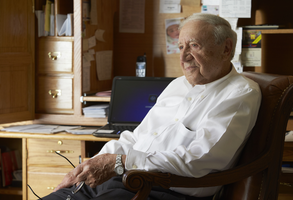
Photograph of Henry Kronberg, Las Vegas, Nevada, May 10, 2016
Date
Archival Collection
Description
Holocaust survivor and longtime Las Vegas businessman Henry Kronberg photographed at his Summerlin neighborhood home.
Image
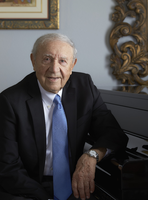
Photograph of Henry Kronberg, Las Vegas, Nevada, May 10, 2016
Date
Archival Collection
Description
Holocaust survivor and longtime Las Vegas businessman Henry Kronberg photographed at his Summerlin neighborhood home.
Image
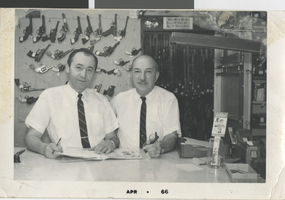
Photograph of Henry Kronberg and unidentified man at Stoney's Pawn Shop, April 1966
Date
Archival Collection
Description
Henry Kronberg stands at the counter in front of the firearms display at Stoney's Pawn Shop at 126 S. First Street.
Image
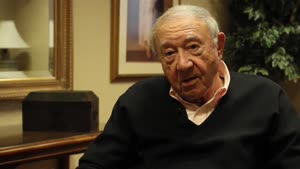
Video, Generations of the Shoah interview with Henry Kronberg, by Esther Finder, 2013
Date
Archival Collection
Description
Interview with Henry Kronberg by Esther Finder. Kronberg survived the Holocaust and discusses the fate of his family, and his life in America.
Moving Image
Audio clip from interview with Henry Kronberg on April 13, 2015
Date
Archival Collection
Description
In this clip, Henry Kronberg discusses acquiring Stoney's, a pawn shop on First Street, in 1964. When he arrived in Las Vegas in 1962, he worked with his brother-in-law at Pioneer Loan, then purchased Stoney's, which he grew into the most successful pawnshop in town. He discusses his business partner Dave Pearlmutter, and his international customers.
Sound

Transcript of interview with Henry Kronberg by Barbara Tabach, February 26, 2015 and April 13, 2015
Date
Archival Collection
Description
Interview with Henry Kronberg by Barbara Tabach in two sessions, February 26 and April 13, 2015. In the first session Kronberg talks about his childhood in Germany and Poland and his experience being imprisoned by the Gestapo, and transported to a concentration camp. He survived the Holocaust and met his wife, and they moved to the United States in 1946. He discusses being reunited with his sister in Las Vegas after decades of searching, and moved his family to Las Vegas in 1962. Kronberg talks about becoming involved with Jewish life here, and his wife, Lillian's involvement at Temple Beth Sholom. In the second session, Kronberg discusses purchasing Stoney's, a loan and pawn shop, including some of the clientele and merchandise. He also discusses other social and environmental concerns like anti-Semitism and water resources in Southern Nevada.
Henry Kronberg was born in 1920 and spent his early childhood in a town on the border of Poland and Germany, about 40 miles from Krakow. For years he felt uncomfortable telling his story of surviving the Nazi concentration camps of World War II. Today his name is linked to the Sperling Kronberg Mack Holocaust Resource Center in Las Vegas. And in his soft-spoken manner, Henry recalls his ordeal of loss of family and survival during this most heinous of situations through backbreaking labor and ingenuity. At the end of the war, Henry met the love of his life, Lillian, also a survivor. The two married in 1946 in Frankfurt and immigrated to New Jersey where she had relatives. He describes their difficulties and the various jobs he held until becoming an excellent baker. Then in 1962 an interesting choice took him to a bar mitzvah in Canada. While there the dinner conversation lead him to a great discovery?his sister Lala had survived and was living in Las Vegas. Soon he moved his wife and daughter to Las Vegas. His first foray into business was with his brother-in-law. However, soon it was important to be independent and to control his own destiny. He purchased a going concern, Stoney's Pawn Shop, from Dr. Alexander Coblentz, one of the city's first doctors. He became the fourth owner of Stoney's and operated it until selling it to Steven Mack in 1998. Henry and his wife were active in the Jewish community. They joined Temple Beth Sholom and became fast friends with many of the early leaders of Las Vegas and became a respected member of the secular and Jewish communities.
Text

Photograph of Max Goot, Max Schmeling, Henry Kronberg, Harry Levy, unidentified man, and Morry Spencer, at Jewish Federation Luncheon at Caesars Palace, approximately 1970
Date
Archival Collection
Description
In this photograph, German boxer Max Schmeling pretends to punch Henry Kronberg in the chin. On the far right, holding a cigar, is Morry Spencer, who was the Director of the Small Business Administration.
Image
